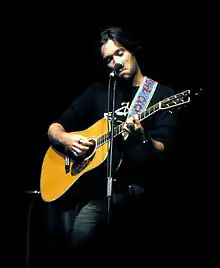Gay Messiah
"Gay Messiah" is a song written and performed by American-Canadian singer-songwriter Rufus Wainwright. It originally appeared on his EP, Waiting for a Want, released by DreamWorks Records in June 2004 as a preview of his fourth studio album, Want Two, released by Geffen Records in November 2004.
| "Gay Messiah" | |
|---|---|
| Song by Rufus Wainwright | |
| from the EP Waiting for a Want | |
| Language | English |
| Released | 2004 |
| Length | 3:14 |
| Composer(s) | Rufus Wainwright |
Composition
"Gay Messiah" features both Christian and gay iconography,[1] and has been described as an example of Wainwright expressing his sexuality within his work.[2] In the song, Wainwright addresses being labeled a gay icon, which he rejects.[3][4] Instead, Wainwright declares he is "Rufus the Baptist",[5][6] referring to John the Baptist,[4] and sings: "I won't be the one/Baptised in cum".[7] He says of the titular subject: "He will then be reborn from 1970s porn/wearing tube socks with style/and such an innocent smile".[8][9] In his review of Want Two, Pitchfork's Stephen Deusner described the savior character as "Wainwright's own personal Jesus".[1]

According to Wainwright, the song was inspired in part by the Israeli–Palestinian conflict. In 2004, he told The Independent:
Religious wars are back in fashion, and the main problem is that I don't empathise with religious sentiment. Gay people are not represented in that literature. So even though it's silly, I feel like I can't enter the conversation. So I decided to write a song about how the next messiah would be a homosexual. The Bible needs a gay gospel.[7]
In 2005, he said of the song's origins:
It was written ages ago as a party song, to kind of liven up a dinner table. And then as the political climate thickened it became a kind of liberal anthem. On stage I began to preface it with a plea to go out and vote Democrat. And now it has become a kind of literal prayer. We do actually need this divine porn star to come down and teach us what it means to be human again...[8]
Reception
In his review of Want Two, BBC's Chris Jones said the song "is a fine example of [Wainwright's] tongue-in-cheek ability to mix the sacred and profane, heralding a Republican-baiting prophet".[9]
References
- Deusner, Stephen (November 15, 2004). "Rufus Wainwright: Want Two". Pitchfork. Condé Nast. Retrieved May 9, 2017.
- Wener, Ben (September 24, 2007). "Rufus Wainwright's Judy Garland tribute a wobbly charmer". Orange County Register. Digital First Media. ISSN 0886-4934. OCLC 12199155. Retrieved May 9, 2017.
- "Rufus Wainwright: The Gay Messiah Is Coming". Star Observer. Darlinghurst, New South Wales: Gay and Lesbian Community Publishing Limited. April 20, 2008. ISSN 0819-5129. OCLC 26727666. Retrieved May 9, 2017.
- Sinagra, Laura (July 29, 2005). "The Listings: July 29 -- Aug. 4; Rufus Wainwright, Ben Folds". The New York Times. ISSN 0362-4331. OCLC 1645522.
- Rimalower, Ben (June 14, 2016). "Rufus Wainwright on What Makes Judy Garland a Gay Icon". Playbill. New York City. ISSN 0551-0678. Retrieved May 9, 2017.
- Ganahl, Jane (January 9, 2004). "From rehab to new album, he's walked through fire and come out singing -- today, Rufus Wainwright may be the darling of pop, but he's no messiah: 'Rufus the Baptist I be'". San Francisco Chronicle. Hearst Communications. ISSN 1932-8672. OCLC 8812614. Retrieved May 9, 2017.
- "Rufus Wainwright: Living the high life". The Independent. London. May 15, 2004. ISSN 0951-9467. OCLC 185201487. Retrieved May 9, 2017.
- Adams, Tim (February 20, 2005). "Crystal clear". The Guardian. London: Guardian News and Media. ISSN 0261-3077. OCLC 60623878. Retrieved May 9, 2017.
- Jones, Chris (2005). "Rufus Wainwright Want Two Review". BBC. Retrieved May 9, 2017.